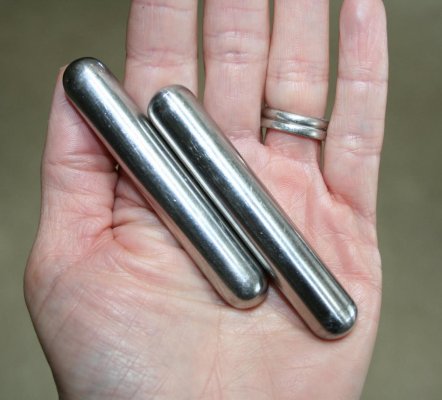I read the stuff on the De-Bug TM site and here is what I see is the major flaw with this and other similar systems like Algae-X. Let's say for the moment that the weak magnetic fields set up by these systems actually do what the De-Bug TM people claim, and kill the bacteria by tearing them apart.
So what?
The units are installed in the fuel lines between the tank(s) and the engine(s). At least that's how they've been illustrated in all the literature I've seen about them over the years. So the tiny dead bodies get fed to the engines. Again, so what? It's not like the engine's going to stop.
And before one says, well, the filters will catch the dead bodies before they get to the engine, why won't the same filters catch the live bodies?
It's always been my understanding that the real problem with bacterial and micro-organism growth in fuel is in the tanks where the fuel sits. Over time this contributes to the crud accumulating in the tank which can eventually find its way into the filters and clog them. So it would seem that if one wants to use magnetic fields to kill bugs the place to do it is in the tank, not in the fuel line on the way to the engine.
A co-worker in our department in the early 80s was sucker for quasi-scientific miracle cures. One day he saw a magazine ad for a magnetic device that was guaranteed to increase the mileage of a car by at least 15 or 20 percent. The device was mail order and it cost $50.
He ordered one, and what he got for his $50 was a small carboard box containing two small cylindrical magnets with rounded ends, a small roll of electrical tape, and a sheet of instructions. He had recently purchased a new car, a Buick as I recall, and like most cars in the early 80s it had a carburetor.
The instructions said to tape the two magnets to the fuel line just before it entered the carburetor. It was "very important" that the magnetic poles were aligned in a specific way.
The theory, backed up with a bunch of scientific blather in the ad and on the instructions, was that as the fuel passed between the magnets the magnetic field would align the molecules in such a way to make them burn more efficiently.
So this fellow dutifully installed the magnets and began keeping meticulous records of his fuel usage.
But..... our video engineer, quite the practical joker, immediately began adding gas to the fellow's car when he was at the cafeteria for lunch. This was in the days before locking gas caps were common, so it was easy to do.
The Buick had been getting about 15 mpg or so on this fellow's daily commute. When his mileage rocketed up into the mid 20s he was ecstatic and he lost no opportunity to preach the wonders of the effect of magnetic fields on fuel molecules to all of us and urge us to buy and install the same kit.
Our engineer kept this up for about a month. And then one day he stopped putting fuel in the car at lunchtime. The Buick's mileage immediately went back to 15 mpg.
Our co-worker was frantic. He remounted the magnets. He realigned their positions. When nothing worked, he even ordered another $50 kit. He tried to contact the company that sold the kit but could never get through.
Through all this he maintained his steadfast belief that the magnetic field theory of fuel economy was totally valid and miraculous. He'd experienced it, right?
I asked him one day if it had ever occurred to him that even if the magnetic field did "align" the fuel molecules, the fuel was then dumping into the float bowl where it was going to get shook up and heated up and then sucked through the jets and through the manifolds and valves and into the cylinders and how would fuel molecules remain "aligned" through all of that even if by some miracle they had been back at the magnets, but he refused to accept any of that.
He left our organization a few months later for another position in the company. When I saw him again a couple of years after that I asked him if he was still running the magnets on his fuel line. He said yes, and he was convinced that if he kept monkeying with them he'd get his mid-20s mileage back again.
BTW, our engineer told me what the magnets in the kit were. They were cow magnets which could be purchased at farm stores for 25 cents apiece or something like that. They are round and smooth because their purpose is to be "fed" to a cow where it ends up in the first stomach and captures bits of wire and fence nails and other metal bits that cows can pick up while grazing and prevents them from moving farther through the digestive system.
Sometimes the most scientific-sounding "explanation" just can't trump basic logic and common sense.






